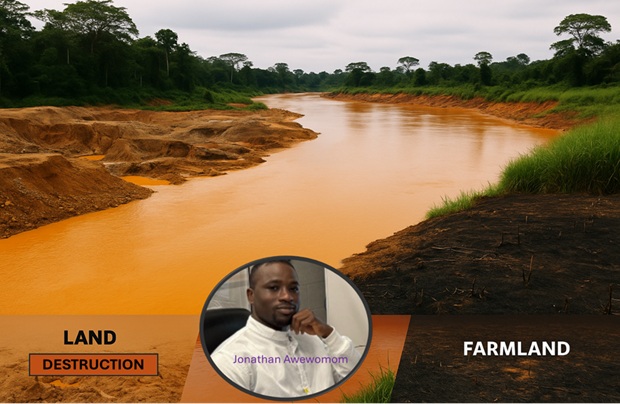
Galamsey’s Toll: What We’ve Already Lost
Every time we talk about galamsey, it’s common to focus on what might happen tomorrow. But Ghana has already paid dearly. We have lost land, water, lives, credibility, and fortunes. This is not speculation, these are concrete costs, carried by farmers, children, ministers, the state itself. Let’s look at the damage already done, then ask whether it can still be undone.
Land, Water, Farmland: The Swept-Away Foundations
Over 4,700 hectares of land have been irreversibly damaged by illegal mining in at least seven regions. Forest cover stripped, soils eroded, and land that once grew cocoa, food crops, or timber has become pits and wasteland.
Rivers Pra, Ankobra, Offin, Birim, once sources of potable water, fish, transport and irrigation are now poisoned with mercury, cyanide, and heavy metals. In many places, the water has become muddy, toxic, or simply untreatable.
Human Health, Forgotten places, Invisible pain, Lives & Losses
Children and community members in mining regions are reporting kidney disorders, skin diseases, and respiratory problems. A recent scientific-government study found soil in Konongo Zongo averaging 56.4 ppm mercury, vastly exceeding the WHO safe threshold of 10 ppm. Arsenic levels were off the charts in multiple regions.
Children and community members in mining regions are reporting kidney disorders, skin diseases, and respiratory problems, with a recent scientific-government study finding soil in Konongo Zongo averaging 56.4 ppm mercury over five times the WHO safe limit, and arsenic levels off the charts. Such contamination carries severe implications: rising cases of neurological damage and chronic kidney disease, lost school and workdays, long-term healthcare costs that strain the public health system, and generational risks as contaminated soils continue to poison future crops. Left unaddressed, this also threatens Ghana’s agricultural exports, risking international rejection and further economic loss
Deaths at illegal mine sites are tragically common, with dozens of miners buried alive in pit collapses such as the 2019 Dompoase disaster that claimed at least 18 lives. The human cost has also extended to those fighting galamsey, in 2023, a soldier was killed during a confrontation with illegal miners near Diaso in the Central Region, and in 2024 two Operation Halt officers were ambushed and shot while on patrol in the Western Region. These incidents underline that galamsey is not just an environmental threat but a national security crisis, costing both ordinary citizens and the state its most valuable resource: human lives. Left unchecked, this crisis risks not only chronic illness and generational soil contamination but also erodes morale and public confidence as the nation continues to bury its defenders.
Public Funds Spent and Missed Revenue
- The cost to reclaim land and water bodies already devastated has been estimated at over US$250 million in the Western Region alone.
- Ghana is losing more than US$2.3 billion annually in tax revenues, gold smuggling, and uncollected royalties because much of the mining is illegal and escapes regulation.
Why We Must See This as a Call to Account
We must acknowledge that these losses are not inevitable. Each hectare lost, each child sick, each river tainted marks failure of enforcement, of policy, of vision.
If Ghana does nothing, the losses won’t just multiply, they will compound degraded soil passing damage to next generation, diseases going untreated, industries unwilling to risk contaminated inputs, and international reputation in tatters. Ghana has already lost much land, water, funds and lives. But loss is not the end. We can still stop the next chapter from being worse. The question is whether we have the courage to count ourselves among the losses, then reclaim what remains.
DISCLAIMER: The Views, Comments, Opinions, Contributions and Statements made by Readers and Contributors on this platform do not necessarily represent the views or policy of Multimedia Group Limited.
DISCLAIMER: The Views, Comments, Opinions, Contributions and Statements made by Readers and Contributors on this platform do not necessarily represent the views or policy of Multimedia Group Limited.
Source: myjoyonline.com










